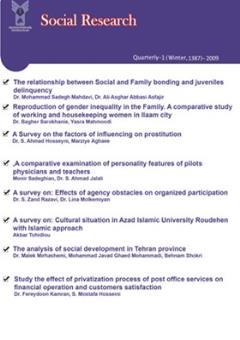The role of tax sociological factors on the level of social welfare of taxpayers in Tehran
Subject Areas : Social Researches
Reza Makhdomijavan
1
,
Mehrdad Mohammadian
2
*
![]() ,
Mohammad Alipoor
3
,
Mohammad Alipoor
3
1 - Department of Social Sciences, Khalkhal Branch, Islamic Azad University, Khalkhal, Iran
2 - Department of Social Sciences, Khalkhal Branch, Islamic Azad University, Khalkhal, Iran
3 - گروه حسابداری، واحد خلخال، دانشگاه آزاد اسلامی، خلخال، ایران.
Keywords: tax evasion, social welfare , taxpayers,
Abstract :
The present study was conducted with the aim of identifying the sociological factors of tax evasion and its role on the level of social welfare of taxpayers. The present research method is of a mixed type (qualitative and quantitative). The statistical population of the research in the qualitative part is all the elites and sociologists in the field of sociology, economics and development at the country level, who were selected by the available and targeted sampling method (60 people up to theoretical saturation) and the statistical population of the research in the quantitative part is all taxpayers. Tehran city is in region 12, whose population is more than 100,000 people, and based on Cochran's formula, 383 people were selected based on cluster random sampling. the qualitative part of the research, a semi-open or semi-structured interview was used, a researcher-made questionnaire based on the conducted interviews and their coding was used. The validity of the questionnaire was confirmed by content validity (CVR) and construct validity and the reliability of the instrument was confirmed by Cronbach's alpha method. with the open, central and selective coding method, the main were obtained, and based on that, the theoretical model of the research was presented and hypotheses were developed, and in the quantitative part, using Lisrel software, The review of the presented model was done. The obtained results indicate that there is a relationship between tax culture, social justice and tax laws and regulations and social welfare. However, social and cultural status of taxpayers and social welfare. It was also found that the sociological factors of tax evasion had an impact on social welfare, living conditions, justice and equality, and the environment.
امیری سلوشی، نیکو (1401). تاثیر مسئولیت پذیری اجتماعی بر جلوگیری از فرار مالیاتی شرکتها (مورد مطالعه: شرکتهای فعال در بورس اوراق بهادار تهران)، پژوهشهای جدید در مدیریت و حسابداری، شماره 54، ص 457-464.
امین رشتی، نارسیس، صیام، هدی، محرابیان، آزادی، سیفیپور، رویا (1402). بررسی عوامل موثر بر فرار مالیاتی در شرکتهای سخت مالیاتده با استفاده از روش اثرگذاری غیرخطی، اقتصاد کاربردی، شماره 44، ص 19-35.
اوبراین، مارتین، پنا، سو (1397)، نظریه پردازی رفاه (روشنگری و جامعه مدرن). ترجمه رضا صفری شالی و فرهاد بزرافکن، تهران: خوارزمی.
اورشات، ویم فون، اُپلیکا، مایکل، فوافینگر، بریگیت (1396). فرهنگ و دولت رفاه، ترجمه ابوذر قاسمی نژاد، تهران: موسسه عالی پژوهش تامین اجتماعی.
Allam, A., Moussa, T., Abdelhady, M., Yamen, A. (2023). National cultre and tax evasion: The role of the institutional environment quality, Journal of International Accounting, Auditing and Taxation, 52: 100-559.
Batrancea, L. M., Kudla, J., Blaszczak, B., Kopyt, M. (2022). Differences in tax evasion attitudes between students and entrepreneurs under the slippery slope framework, Journal of Economic Behavior & Organization, 200: 464-482.
Cai, H., and Liu Q. (2009). Competition and Corporate Tax Avoidance: Evidence From Chinese Industrial Firms. The Economic Journal. 119: 764-795.
Engström, P. and Holmlund, B. (2006). Tax Evasion and Self-Employment in a High-Tax Country: Evidence from Sweden. Uppsala University Working Paper.
Fagbemi, T. O., Uadiale, O. M., and Noah, A. O. (2010). The Ethics of Tax Evasion: Perceptual Evidence from Nigeria. European Journal of Social Sciences, 17: 360-371.
Herranz, M. M., Turino, F. (2023). Tax evasion, fiscal policy and public debt: Evidence from Spain, Economic systems, 7: 101-121.
Khalil, S., Sidani, Y. (2020). The influence of religiosity on tax evasion attitudes in Lebanon, Journal of International Accounting, Auditing and Taxation, 40: 100-335.
Langenmary, D., Zyska, L. (2023). Escaping the exchange of information: Tax evasion via citizenship-by-investment, Journal of Public Economics, 221: 48-65.
Levin, J. and Widell, L. M. (2007). Tax Evasion in Kenya and Tanzania: Evidence from Missing Imports. Orebro University Working Paper, No. 8.
Nagy, Z. (2011). The Fight Against Income Tax Evasion in Hungary. Acta Polytechnica Hungarica, 8: 103-116.
PlanoClark, V., Creswell, J., O'Neil Green, D., & Shope, R. (2008). Mixing quantitative and qualitative approaches: An introduction to emergent mixed methods research. In: S. Hesse-Biber & P. Leavy (Eds.) Handbook of emergent methods, New York: The Guilford Press.
Sainsbury, D. (2001). Welfare state challenges and responses: institutional and ideological resilience or restructuring? Acta Sociologica 44(3): 257–265.

